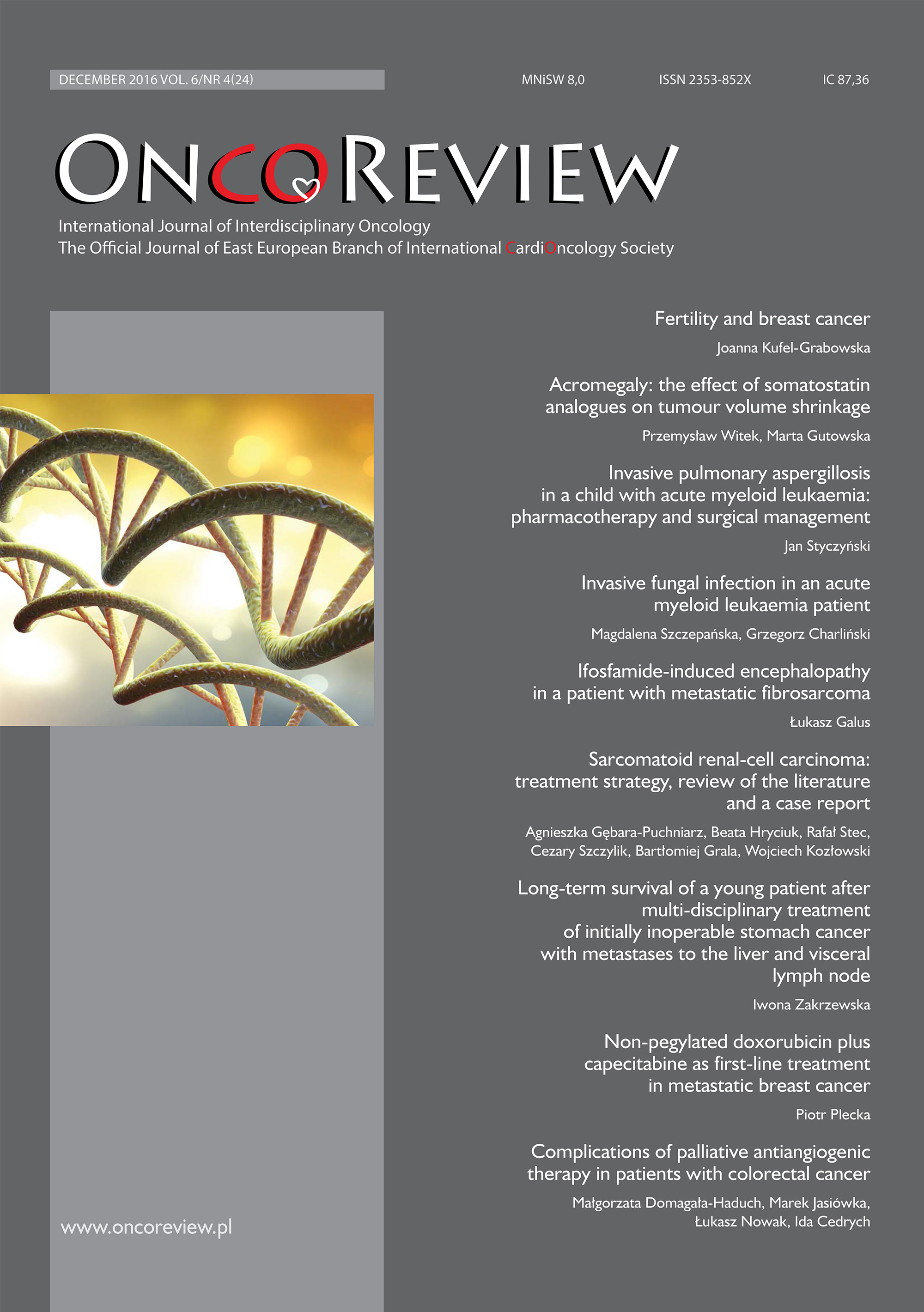Non-pegylated liposomal doxorubicin plus capecitabine as first-line treatment in metastatic breast cancer Original article
Main Article Content
Abstract
Purpose: To determine the toxicity and efficacy profile of non-pegylated liposomal doxorubicin in combination with capecitabine administered according to LipAX regimen.
Materials and methods: The analysis included 5 female patients undergoing first-line treatment for metastatic breast cancer. Patients received non-pegylated liposomal doxorubicin intravenously and oral capecitabine at usual doses used for monotherapy, until disease progression or unacceptable toxicity.
Results: Patients received a total of 26 complete treatment cycles according to LipAX regimen. During treatment, 15 toxicities occurred, including 7 adverse events with grade 3 severity. Only two haematological toxicities were observed, and the other 13 were of a non-haematological nature. Only one patient experienced no adverse events. Apart from symptomatic treatment, the capecitabine dose was reduced twice and the non-pegylated liposomal doxorubicin once. Positive clinical outcomes were observed in 4 patients, and disease progression was reported in the case of 1 patient in the course of the treatment. The median time to disease progression was 10.4 months, and the median overall survival was 34.2 months. During the 54-month follow-up, 4 of the patients died. The surviving patient continues treatment.
Conclusions: Therapy according to the LipAX regimen was relatively well tolerated, however, since the majority of patients discontinued treatment due to adverse events, and not disease progression, an adequate reduction in the cytostatic doses should be considered. The use of the LipAX regimen may contribute to the achievement of long-term remission in some patients, a fact that encourages further studies on this form of therapy.
Downloads
Metrics
Article Details

This work is licensed under a Creative Commons Attribution-NonCommercial 4.0 International License.
Copyright: © Medical Education sp. z o.o. This is an Open Access article distributed under the terms of the Attribution-NonCommercial 4.0 International (CC BY-NC 4.0). License (https://creativecommons.org/licenses/by-nc/4.0/), allowing third parties to copy and redistribute the material in any medium or format and to remix, transform, and build upon the material, provided the original work is properly cited and states its license.
Address reprint requests to: Medical Education, Marcin Kuźma (marcin.kuzma@mededu.pl)
References
2. Stavridi F, Palmieri C. Efficacy and toxicity of nonpegylated liposomal doxorubicin in breast cancer. Expert Rev. Anticancer Ther 2008; 8(12): 1859-1869.
3. Harris L, Batist G, Belt R et al. Liposome-Encapsulated Doxorubicin Compared with Conventional Doxorubicin in a Randomized Multicenter Trial as First Line Therapy of Metastatic Breast Carcinoma. Cancer 2002; 94(1): 25-36.
4. Bajetta E, Procopio G, Celio L et al. Safety and efficacy of two different doses of capecitabine in the treatment of advanced breast cancer in older women. J Clin Oncol 2005; 23: 2155-2161.
5. Valero V, Buzdar AU, Theriault RL et al. Phase II trial of liposome-encapsulated doxorubicin, cyclophosphamide and fluorouracil as first-line therapy in patients with metastatic breast cancer. J Clin Oncol 1999; 17: 1425-1434.
6. Chan S, Davidson N, Juozaityte E et al. Phase III trial of liposomal doxorubicin and cyclophosphamide compared with epirubicin and cyclophosphamide as first-line therapy for metastatic breast cancer. Ann Oncol 2004; 15: 1524-1534.
7. Colomer R, Tusquerts I, Calvo L et al. Liposomal doxorubicin (M) plus gemcitabine (G) as first line treatment in metastatic breast cancer: a phase I-II study. J Clin Oncol 2006; 24(suppl 18): 10651.
8. Sparano JA, Vrdoljak E, Rixe O et al. Randomized Phase III Trial of Ixabepilone Plus Capecitabine Versus Capecitabine in Patients With Metastatic Breast Cancer Previously Treated With an Anthracycline and a Taxane. J Clin Oncol 2010; 28(20): 3256-3263.
9. Robert NJ, Dieras V, Glaspy J et al. Ribbon-1: Randomized, Double-Blind, Placebo-Controled, Phase III Trial of Chemotherapy With or Without Bavacizimab for First-Line Treatment of Human Epidermal Growth Factor Receptor 2-Negarive, Locally Recurrent or Metastatic Breast Cancer. J Clin Ocol 2011; 29(10): 1252-1261.
10. Hennessy BT, Gauthier AM, Michaud LB et al. Lower dose capecitabine has a more favorable therapeutic index in metastatic breast cancer: retrospective analysis of patients treated at M.D. Anderson Cancer Center and a review of capecitabine toxicity in the literature. Ann Oncol 2005; 16: 1286-1296.
11. Batist G, Ramakrishnan G, Rao CS et al. Reduced cardiotoxicity and preserved antitumor efficacy of liposome encapsulated doxorubicin and cyclophosphamide compared with conventional doxorubicin and cyclophosphamide in a randomized multicenter trial of metastatic breast cancer. J Clin Oncol 2001; 19: 1444-1454.

